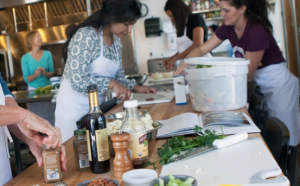Short-term and long-term health can be dictated by a paycheck, a home address, or another social determinant, but Good Bowls is a new initiative seeking to change that.
Alice Ammerman, director of UNC’s Center for Health Promotion and Disease Prevention and Mildred Kaufman Distinguished Professor of nutrition in the Gillings School of Global Public Health, is introducing a new public health initiative to enhance the community’s environmental, economic and social wellbeing in the southeastern United States. Through careful research and development, Ammerman and her team have created a product—Good Bowls—that aims to provide better access to nutritionally valuable food for lower-income consumers, while creating economic opportunities for local farmers and food entrepreneurs.
Food insecurity is prevalent, both within and beyond our community. Busy schedules, multiple jobs, family demands, and financial limitations make it difficult for people to prepare nutritional food quickly and economically, often forcing people to sacrifice healthy options for more convenient ones. While programs like SNAP (Supplemental Nutrition Assistance Program) help defray the cost of food for low-income consumers, access to healthy food often remains limited. Food products typically offered at the local corner- or convenience store are often highly processed and of limited nutritional value.
“Many North Carolinians lack consistent, dependable access to affordable and appealing food for healthy living,” Ammerman said. “Our state ranks among the highest in the country for chronic disease, such as heart disease, diabetes, and obesity, associated with poor nutrition. We know that many cases of chronic disease are preventable or treatable with proper nutrition, and hope Good Bowls will be a tool to help get better food to more people.”
Ammerman and her team are working diligently to bring Good Bowls to stores near you. Funded for a pilot study by the 2016 Felix Harvey Award, Good Bowls are locally-sourced, delicious and nutritious frozen meals designed for sale at two price points: the higher in premium food stores frequented by higher-income consumers (e.g., Weaver Street Market or Fresh Market), and the lower in convenience stores, which tend to be frequented by lower-income consumers for daily food needs particularly in “food deserts.”
Good Bowls are frozen products, and therefore are eligible for purchase with SNAP, which can help reduce food expenses for lower-income consumers. Good Bowls products also have much longer shelf life than fresh foods, incentivizing convenience stores to carry them, as less waste will help the stores maintain their (often slim) margins.
This product will also be attractive to higher-income, health-conscious consumers, as these consumers will find locally-sourced, nutritious, delicious, and convenient meal options for themselves and their families. However, Good Bowls are more than just good food; they provide an opportunity for altruistic consumers to benefit the local community. By purchasing Good Bowls products at a higher price point, buyers can support local food entrepreneurs and growers. This unique business model uses an adaptation of the “buy one, give one” model and takes a social justice approach to providing the same nutritious, premium product to lower-income members of the community, at prices that fit the consumer’s financial needs. Good Bowls are available to any individual or family seeking a healthy and convenient food option, regardless of income and access disparities.
The Good Bowls business model includes a collaborative network of partners, linking local farmers with commercial kitchens and different retail markets to generate a sustainable, community-based product. First, Southeastern farmers face many challenges and often need to identify new market opportunities. There is great need to strengthen business opportunities in rural and economically distressed communities, while supporting new markets for local farmers. Good Bowls will use produce from local farmers, including cosmetically-challenged food (“ugly food”) or excess produce that would otherwise go to waste. This way, Good Bowls not only brings business to local farmers, but reduces food waste by repurposing fresh produce.  Second, value-added processing facilities (VAPFs) and certified community kitchens are plentiful, but often under-utilized. To stimulate business for facility owners and keep product costs low, Good Bowls will be produced in certified community kitchens or VAPFs linked with local producers. A local woman-owned start-up business, Food Insight Group (FIG) will coordinate recipe development, labeling, packaging, marketing materials, and food safety oversight.
Second, value-added processing facilities (VAPFs) and certified community kitchens are plentiful, but often under-utilized. To stimulate business for facility owners and keep product costs low, Good Bowls will be produced in certified community kitchens or VAPFs linked with local producers. A local woman-owned start-up business, Food Insight Group (FIG) will coordinate recipe development, labeling, packaging, marketing materials, and food safety oversight.
Finally, Good Bowls makes healthy eating both convenient and culturally exciting. Ammerman and her partners at Food Insight Group are advancing southern food culture by developing frozen food recipes at the nexus of Mediterranean diet-inspired nutrition and traditional Southern cuisine. For example, Good Bowls integrate southern staples like collard greens, sweet potatoes, peppers, corn, and beans—however, the food is prepared in exciting, innovative ways, consistent with the healthful Mediterranean diet.
Ammerman said she hopes the entrepreneurial project will open opportunity for community partnerships and mutually beneficial business relations, and cultivate an environment for accessible and affordable food. We hope that “Good Bowls will promote good health for individuals, the community, and the planet, and ultimately help close the health disparity gap.”
To stay connected with Good Bowls, find us at:
Facebook: https://www.facebook.com/goodbowls/ (@goodbowls)
Instagram: https://www.instagram.com/good_bowls/ (@good_bowls)
Conflict of Interest Disclosure: Dr. Alice Ammerman, director of the UNC Center for Health Promotion and Disease Prevention, founded and has equity ownership in Good Bowls, LLC. This relationship has been disclosed to and is under management by UNC-Chapel Hill.
